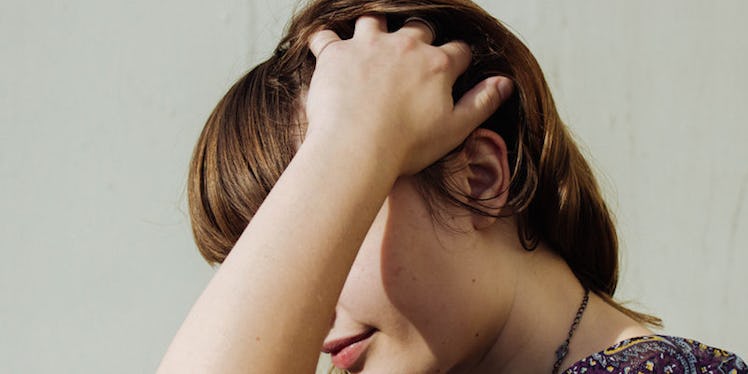
This Could Be The Reason Your Hair Keeps Falling Out
A lot of people don't realize they don't have to suffer from anemia in order to experience hair loss. Hair loss, in fact, can be directly linked to iron deficiency. Iron deficiency is a spectrum, and even slightly lowered levels of anemia may lead to hair loss. This is why it's important to understand the link between proper nutrition and thinning hair.
Why does low iron cause hair loss, you ask? When the human body doesn't get enough iron, it goes into a “survival” state, which means the body moves oxygen differently in order to keep vital functions operating. This means that oxygen is moved away from nonessential processes, such as keeping your hair growing.
The explanation for why iron deficiency leads to hair loss is quite simple. The body doesn't get the iron it needs, so its changes its operations in order to ensure that it survives. Hair growth is low on the list of things that the body “worries” about at this time. It wants to use oxygen in order to keep vital organs working well and so on.
As you can see, the effects of low iron are fairly serious. Those who have slightly lower levels may experience hair loss just as people with anemia may. Along the whole spectrum of iron deficiency, there may be thinning hair and hair loss. The easiest way to restore hair is to correct the iron deficiency.
With this in mind, let's talk about the smartest ways to restore iron in a safe, healthy manner:
How much iron do you need?
Usually, men and women who aren't having their periods require 10 milligrams of iron each day. Menstruating women and women who are breastfeeding need a bit more. Fifteen milligrams is the recommended daily dose of iron for women in these situations. It's possible to track iron intake via online tools, or to calculate it yourself by looking at your daily diet, determining portions you've eaten and then figuring out how much iron they contain.
If you're under the daily allotment, it's entirely possible that your hair loss is linked with an iron deficiency.
How do you boost iron levels?
First off, it's important to stay within the daily guidelines. In other words, taking in a lot more iron than recommended won't be a good idea. Iron supplements are fine, as long as they don't give you more than the daily recommended amount of iron.
Bear in mind that you may be getting iron from your diet, as well. So, be careful about how much you take. Tracking iron intake from food while using an iron supplement is a good way to ensure you are boosting iron levels without going over the limit.
In terms of food, certain types of foods have good iron content. Adding these foods to your daily diet may be enough to elevate iron levels to the recommended levels. Foods that are classified as good sources of iron include animal products which contain “heme” iron. Examples include meat, poultry and fish.
This type of iron is easy for the body to absorb. There is also iron of the non-heme variety in some plant-based foods, including dried beans, lentils, peas and certain fruit and veggies. Some countries also fortify grain-based food products with iron, including breakfast cereals, flours and pastas.
When it comes to boosting absorption of non-heme iron, consider adding more Vitamin C to your diet. Getting enough of this vitamin will make it easier to boost your iron levels, as your body will take in the iron in a more efficient, substantial way. You may buy a Vitamin C supplement or eat more citrus fruits. There are a variety of ways to get more Vitamin C.
Now that we've talked about the smartest ways to add more iron to your diet without going overboard, let's discuss other strategies for fighting hair loss.
Use the right shampoo and conditioner.
Some shampoos are hard on the hair and may promote even more hair loss. For example, shampoos with sulfates are fairly harsh, and they're probably not the best choices for those who are trying to block hair loss.
Instead of choosing formulas with a lot of lab-created chemicals, you should consider organic formulas that don't have the chemical downside. These should be fortified with essential oils, which are known to spark hair growth or stem hair loss. Examples of beneficial essential oils include rosemary, cedarwood and thyme. In addition, jojoba oil and grapeseed oil are quite good for the hair.
When shampooing, be gentle. Don't be too rough on the hair. Use a conditioner that is also designed to fight hair loss, and rinse it out with warm water, not hot water. A gentle, organic approach to hair loss will help you to get better results, as it'll go easy on your hair. However, the way you take care of your hair when it's wet will also matter.
We don't recommend brushing wet hair with a standard brush. Instead, comb it starting at the ends and gradually moving upward in order to avoid breakage. Also, avoid heat styling, as it may be quite harsh and promote damage. It's OK to heat style sometimes, however, you may want to find a hairstyle which is more compatible with your natural hair texture.
If you're experiencing hair loss but aren't anemic, you may still be lacking a healthy dosage of iron in your daily diet. Try out the aforementioned tips, and your hair and your body will thank you for it.